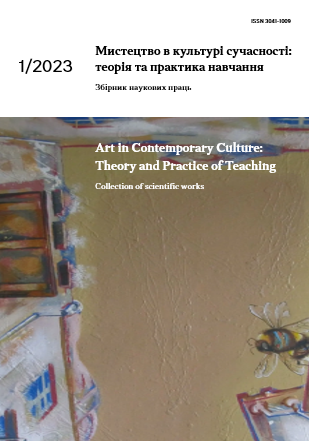The state of training of art education specialists in the universities of the European Union and the USA for the use of music therapy in professional activities
Published 2023-10-30
Keywords
- university education in Europe and the USA, music therapist, artistic training, health care technologies, music therapy
Copyright (c) 2023 Rufina Dobrovolska

This work is licensed under a Creative Commons Attribution 4.0 International License.
How to Cite
Abstract
The goal of modern university education in Europe and the USA is training, upbringing, harmonious development and socialization of a highly moral, spiritually developed personality, which takes place with the use of health-preserving technologies. This goal acquires great importance precisely in the conditions of the educational space, since it covers a significant part of the population, which is characterized by differences in cultural level, material status, and age. The number of students with special needs is increasing in university education. The use of music therapy in the modern university space contributes to solving the identified problems, for which it is necessary to implement: highly qualified training of personnel in music therapy and educational projects and programs in universities in Europe and the USA.
During the 20th and 21st centuries in Europe and the USA, music therapy began to be intensively introduced into university education to activate educational and intellectual activity, model a health-saving educational environment, meet the special needs of student youth in inclusive education, and create a STEAM learning environment. To date, Ukrainian scientists have systematized only certain aspects of scientific knowledge about music therapy, which is introduced into the content of modern university education in Europe and the USA. In this way, the leading international experience on the training of specialists in the artistic field to apply music therapy in professional activities has not been summarized, the system of measures to attract students to these classes has not been substantiated, and data on the specifics of the content of classes with music therapy tools have not been systematized.
The consequence of using music therapy in the university environment should be the expression of feelings and positive changes in the behavior of subjects of education during communication with others and reflection. Music therapy solves communication issues, improves motivation, attention, behavior, improves memory and the ability to learn, affects the emotional sphere of the individual.
Downloads
References
- Кравцова Н. Є., Сізова Н. С., Белінська Т. В., Кравченко І. М. Педагогічні особливості використання інформаційно-комунікаційних технологій у розвитку музичної обдарованості майбутніх учителів музичного мистецтва. Актуальні питання гуманітарних наук: міжвузівський збірник наукових праць молодих вчених Дрогобицького державного педагогічного університету імені Івана Франка. Вип.35. Т. 3. Дрогобич, 2021. С. 56-63. https://doi.org/10.24919/2308-4863/35-3-44
- Слободиська О. А. Використання арт-терапевтичних технологій у підготовці майбутніх вчителів музичного мистецтва. «Науковий часопис Національного педагогічного університету імені М. П. Драгоманова». Серія 5. Педагогічні науки: реалії та перспективи». Київ, 2019. Вип. № 68. https://doi.org/10.31392/2311-5491/2019-68.41
- Federal Ministry of Labour, Social Affairs, Health and Consumer Protection. (n.d.). MusiktherapeutInnenliste [List of Music Therapists]. Retrieved October 11, 2019. http://www.musiktherapeutenliste.at
- Li K, Weng L, Wang X. The State of Music Therapy Studies in the Past 20 Years: A Bibliometric Analysis. Frontiers in Psychology. 2021 Vol. 12. https://doi.org/10.3389/fpsyg.2021.697726
- Melissa Mercadal-Brotons, Patricia L. Sabbatella & María Teresa Del Moral Marcos Music therapy as a profession in Spain: Past, present and future. Approaches: An Interdisciplinary Journal of Music Therapy. 2017. Vol. 9 (1). P. 111-119. https://www.academia.edu/18657723/
- Music_therapy_as_a_profession_in_Spain_Past_present_and_future
- NYU Steinhardt. PhD, Music Education: For College and University Faculty. https://steinhardt.nyu.edu/degree/phd-music-education-college-and-university-faculty/curriculum
- NYU Steinhardt. DOCTOR OF PHILOSOPHY Music Education with a Specialization in Music Therapy. https://steinhardt.nyu.edu/degree/phd-music-education-specialization-music-therapy
- Phan Quoc, E., Riedl, H., Smetana, M. & Stegemann, T. Zur beruflichen Situation von Musiktherapeut.innen in Österreich: Ergebnisse einer OnlineUmfrage [Music therapy in Austria: A national survey study on the professional situation of music therapists]. Musiktherapeutische Umschau. 2019. Vol. 40, № 3, S. 236–248. https://doi.org/10.13109/muum.2019.40.3.236.en
- Richard M. Graham The Education of the Music Therapist. College Music Symposium. 1974. Vol. 14 pp. 50-59.
- Sabbatella, P., & Mercadal-Brotons, M. Musicoterapia en España: Situación Profesional y Laboral. Actualización 2012. En M. Pérez Eizagirre (Coord.), Actas del IV Congreso Nacional de Musicoterapia. La Musicoterapia como profesión emergente en el nuevo contexto social. Madrid: Editorial Fundación Musicoterapia y Salud. 2014.
- Vicente Alejandro March Lujan Musicoterapia no Século XXI na Espanha: situação e desenvolvimento profissional, formativo e associative. ANO XXIII – NÚMERO 32 – EDIÇÃO COMEMORATIVA 25 ANOS – 2021 https://doi.org/10.51914/brjmt.32.2021.386





